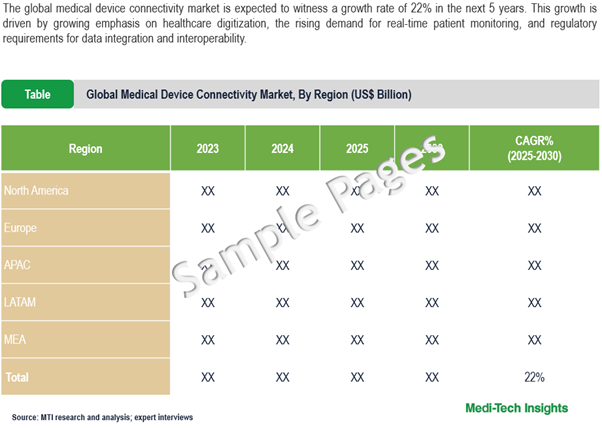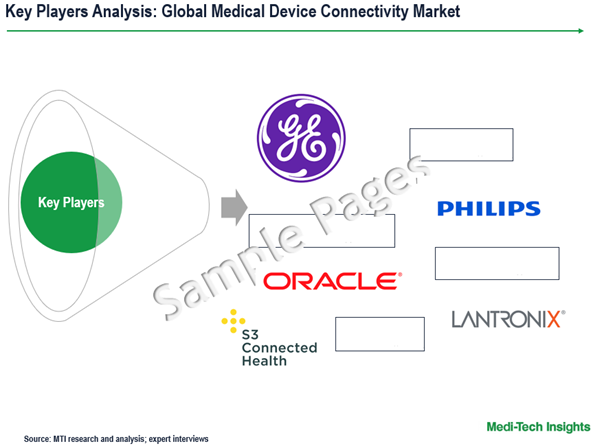
Global Medical Device Connectivity Market Size and Trends Report Segmented by Technology (Wireless, Wired), End User (Hospitals, Ambulatory Surgical Centers, Home Healthcare), Regional Forecast to 2030
The global medical device connectivity market is projected to grow at a CAGR of 22% from 2025 to 2030. This growth is propelled by the surge in healthcare digitization, an increasing need for real-time patient monitoring, and regulatory mandates emphasizing data integration and interoperability across healthcare systems. Medical device connectivity enhances clinical workflows, enabling seamless data exchange between medical devices and Electronic Health Records (EHRs) across hospitals, ambulatory surgical centers, and home healthcare environments. To learn more about the research report, download a sample report.
Report Overview
The medical device connectivity market is centered on technologies and services that enable data sharing, improve patient care, and streamline healthcare operations. Unlike conventional health IT solutions, device connectivity solutions specifically bridge the interface between medical devices and hospital information systems, ensuring real-time, unified data access for clinicians and healthcare providers.
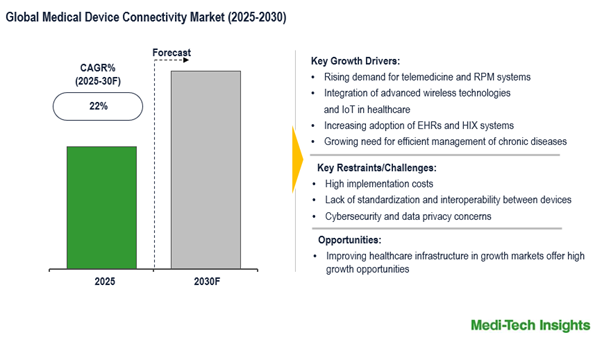
To learn more about the research report, download a sample report.
Rising Demand for Real-Time Data and Compliance with Regulatory Standards
The rising demand for real-time data sharing and regulatory compliance are significant factors driving the medical device connectivity market. Connectivity solutions enhance interoperability, which is crucial for complying with global healthcare standards set by agencies like the FDA, EMA, and HIPAA. These standards demand accurate data management, auditability, and patient privacy, particularly as healthcare shifts toward a data-centric model. Cloud-based medical device connectivity solutions offer healthcare providers scalable and flexible options for data storage and management, enabling facilities to meet compliance standards efficiently without the infrastructure constraints of on-premises solutions.
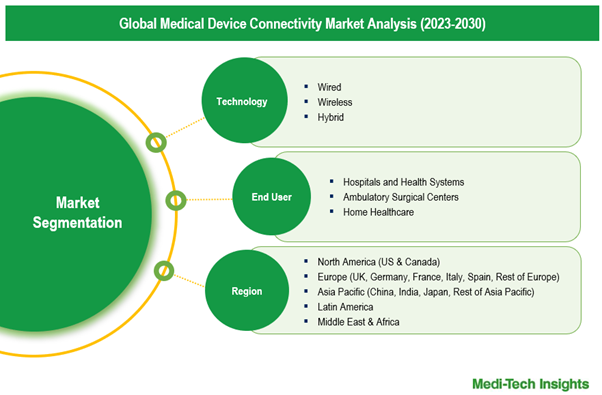
To learn more about the research report, download a sample report.
Key Challenges in Medical Device Connectivity: Security, Data Integration, and Legacy System Compatibility
The medical device connectivity market encounters several challenges, including cybersecurity threats, data integration issues, and the complexities of connecting legacy medical equipment. Ensuring the security of interconnected devices is critical, as these devices handle sensitive patient information, making them vulnerable to cyber threats. Furthermore, integrating connectivity solutions with legacy devices and EHRs can be difficult, as older systems may lack the technical compatibility required for modern interoperability standards. Addressing these issues is essential to fully realize the benefits of medical device connectivity in enhancing healthcare delivery.
Competitive Landscape Analysis
Leading companies in the medical device connectivity market, such as GE Healthcare, Philips Healthcare, Oracle Corporation, Masimo Corporation, S3 Connected Health, Cisco Systems, Medtronic, iHealth Labs, Infosys, and Lantronix, are advancing their connectivity solutions by investing in AI-enabled analytics, strengthening data security features, and forming partnerships with healthcare providers. These companies are also focusing on cloud-based and AI-enhanced solutions to support scalability, adaptability, and compliance in various healthcare settings.
Report Scope
| Report Scope | Details |
| Base Year Considered | 2024 |
| Historical Data | 2023 – 2024 |
| Forecast Period | 2025 – 2030 |
| Growth | 22% |
| Market Drivers |
|
| Market Restraints |
|
| Segment Scope | Technology, End User |
| Regional Scope |
|
| Key Companies Mapped | GE Healthcare, Philips Healthcare, Oracle Corporation, Masimo Corporation, S3 Connected Health, Cisco Systems, Medtronic, iHealth Labs, Infosys, Lantronix; among others |
| Report Highlights | Market Size & Forecast, Growth Drivers & Restraints, Trends, Competitive Analysis |
Market Segmentation
This report by Medi-Tech Insights provides the size of the global medical device connectivity market at the regional- and country-level from 2023 to 2030. The report further segments the market based on technology and end user.
- Market Size & Forecast (2023-2030), By Technology, USD Billion
- Wired
- Wireless
- Hybrid
- Market Size & Forecast (2023-2030), By End User, USD Billion
- Hospitals and Health Systems
- Ambulatory Surgical Centers
- Home Healthcare
- Market Size & Forecast (2023-2030), By Region, USD Billion
- North America
- US
- Canada
- Europe
- Germany
- France
- UK
- Italy
- Spain
- Rest of Europe
- Asia Pacific
- China
- India
- Japan
- Rest of Asia Pacific
- Latin America
- Middle East & Africa
- North America
Key Strategic Questions Addressed
- What is the market size & forecast of the medical device connectivity market?
- What are the historical, present, and forecasted market shares and growth rates of various segments and sub-segments of the medical device connectivity market?
- What are the key trends defining the market?
- What are the major factors impacting the market?
- What are the opportunities prevailing in the market?
- Which region holds the highest market share? Which region is expected to witness the highest growth rate in the next 5 years?
- Who are the major players in the market?
- What are the key strategies adopted by market players?
- Introduction
- Introduction
- Market Scope
- Market Definition
- Segments Covered
- Regional Segmentation
- Research Timeframe
- Currency Considered
- Study Limitations
- Stakeholders
- List of Abbreviations
- Key Conferences and Events (2025-2026)
- Research Methodology
- Secondary Research
- Primary Research
- Market Estimation
- Bottom-Up Approach
- Top-Down Approach
- Market Forecasting
- Executive Summary
- Global Medical Device Connectivity Market Snapshot (2025-2030)
- Segment Overview
- Regional Snapshot
- Competitive Insights
- Market Overview
- Market Dynamics
- Drivers
- Rising demand for telemedicine and RPM systems
- Integration of advanced wireless technologies and IoT in healthcare
- Increasing adoption of EHRs and HIX systems
- Growing need for efficient management of chronic diseases
- Restraints/Challenges
- High implementation costs
- Lack of standardization and interoperability between devices
- Cybersecurity and data privacy concerns
- Opportunities
- Improving healthcare infrastructure in growth markets offer high growth opportunities
- Drivers
- Key Market Trends
- Industry Speaks
- Market Dynamics
- Medical Device Connectivity Market Size & Forecast (2023-2030), By Technology, USD Billion
- Introduction
- Wired
- Wireless
- Hybrid
- Medical Device Connectivity Market Size & Forecast (2023-2030), By End User, USD Billion
- Introduction
- Hospitals and Health Systems
- Ambulatory Surgical Centers
- Home Healthcare
- Global Medical Device Connectivity Market Size & Forecast (2023-2030), By Region, USD Billion
- Introduction
- North America Medical Device Connectivity Market Size & Forecast (2023-2030), By Country, USD Billion
- US
- Market Size & Forecast, By Technology (USD Billion)
- Market Size & Forecast, By End User (USD Billion)
- Canada
- Market Size & Forecast, By Technology (USD Billion)
- Market Size & Forecast, By End User (USD Billion)
- US
- Europe Medical Device Connectivity Market Size & Forecast (2023-2030), By Country, USD Billion
- UK
- Market Size & Forecast, By Technology (USD Billion)
- Market Size & Forecast, By End User (USD Billion)
- Germany
- Market Size & Forecast, By Technology (USD Billion)
- Market Size & Forecast, By End User (USD Billion)
- France
- Market Size & Forecast, By Technology (USD Billion)
- Market Size & Forecast, By End User (USD Billion)
- Italy
- Market Size & Forecast, By Technology (USD Billion)
- Market Size & Forecast, By End User (USD Billion)
- Spain
- Market Size & Forecast, By Technology (USD Billion)
- Market Size & Forecast, By End User (USD Billion)
- Rest of Europe
- Market Size & Forecast, By Technology (USD Billion)
- Market Size & Forecast, By End User (USD Billion)
- UK
- Asia Pacific (APAC) Medical Device Connectivity Market Size & Forecast (2023-2030), By Country, USD Billion
- China
- Market Size & Forecast, By Technology (USD Billion)
- Market Size & Forecast, By End User (USD Billion)
- Japan
- Market Size & Forecast, By Technology (USD Billion)
- Market Size & Forecast, By End User (USD Billion)
- India
- Market Size & Forecast, By Technology (USD Billion)
- Market Size & Forecast, By End User (USD Billion)
- Rest of Asia Pacific
- Market Size & Forecast, By Technology (USD Billion)
- Market Size & Forecast, By End User (USD Billion)
- China
- Latin America (LATAM) Medical Device Connectivity Market Size & Forecast (2023-2030), USD Billion
- Market Size & Forecast, By Technology (USD Billion)
- Market Size & Forecast, By End User (USD Billion)
- Middle East & Africa (MEA) Medical Device Connectivity Market Size & Forecast (2023-2030), USD Billion
- Market Size & Forecast, By Technology (USD Billion)
- Market Size & Forecast, By End User (USD Billion)
- Competitive Landscape
- Key Players and their Competitive Positioning
- Key Player Comparison
- Segment-wise Player Mapping
- Market Share Analysis (2024)
- Company Categorization Matrix
- Dominants/Leaders
- New Entrants
- Emerging Players
- Innovative Players
- Key Strategies Assessment, By Player (2022-2024)
- New Product Launches
- Partnerships, Agreements, & Collaborations
- Mergers & Acquisitions
- Geographic Expansion
- Key Players and their Competitive Positioning
- Company Profiles*(Business Overview, Financial Performance**, Products Offered, Recent Developments)
- GE Healthcare
- Philips Healthcare
- Oracle Corporation
- Masimo Corporation
- S3 Connected Health
- Cisco Systems
- Medtronic
- iHealth Labs
- Infosys
- Lantronix
- Other Prominent Players
Note: *Indicative list
**For listed companies
The study has been compiled based on extensive primary and secondary research.
Secondary Research (Indicative List)
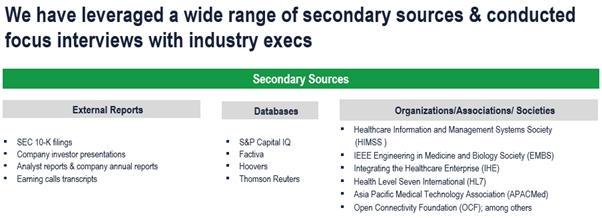
Primary Research
To validate research findings (market size & forecasts, market segmentation, market dynamics, competitive landscape, key industry trends, etc.), extensive primary interviews were conducted with both supply and demand-side stakeholders.
Supply Side Stakeholders:
- Senior Management Level: CEOs, Presidents, Vice-Presidents, Directors, Chief Technology Officers, Chief Commercial Officers
- Mid-Management Level: Product Managers, Sales Managers, Brand Managers, R&D Managers, Business Development Managers, Consultants
Demand Side Stakeholders:
- Hospitals and Health Systems, Ambulatory Surgical Centers, Home Healthcare Organizations, and Others
Breakdown of Primary Interviews
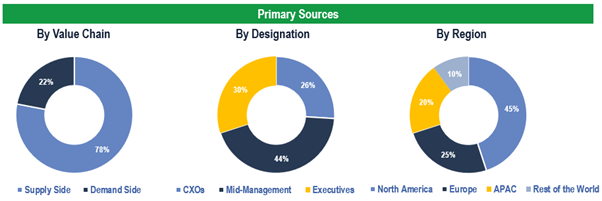
Market Size Estimation
Both ‘Top-Down & Bottom-Up Approaches’ were used to derive market size estimates and forecasts
Data Triangulation
Research findings derived through secondary sources & internal analysis was validated with Primary Interviews, Internal Knowledge Repository and Company’s Sales Data

